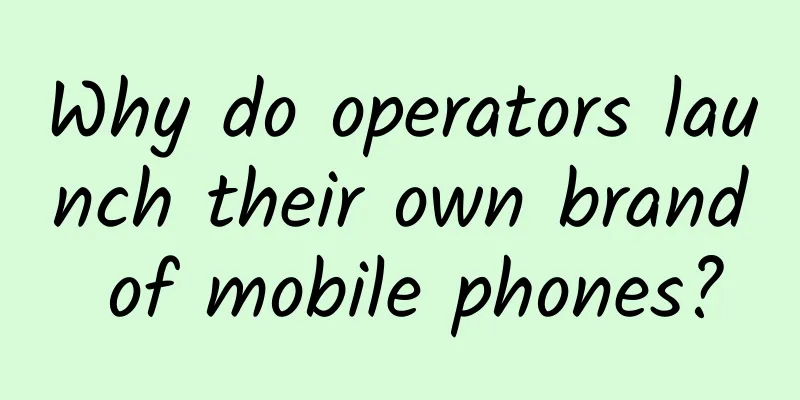Why do operators launch their own brand of mobile phones?

|
Recently, China Telecom released the Tianyi No. 1 2021 cloud phone. Keeping up with the times, this phone also chose straight edges and corners. The operator made its own brand mobile phone and launched a new product. In fact, in November 2019, China Telecom released the first 5G cloud phone, Tianyi No. 1, which introduced comprehensive cloud applications and a price of 999 yuan. This time, the price of China Unicom's "U-MAGIC" is also around 1,500 yuan. The day before, China Unicom launched its own mobile phone brand, called "U-MAGIC", and announced that it had entered the era of self-manufacturing. The three operators have already gathered in the field of self-branded mobile phones, and it seems that it is only natural for China Broadcasting and Television to launch its own mobile phone in the next step.
Speaking of operators making their own phones, China Mobile is definitely the first to be mentioned. At the 2012 China Mobile Global Developer Conference in Guangzhou on December 5, 2012, then-President Li Yue said, "China Mobile will definitely make its own brand of phones." At 10 am on August 2, 2013, China Mobile released its own brand terminals on the first floor of the Innovation Building. The terminals include two smartphones, M601 and M701, CM510/CM5122 4G MIFI, and a mobile power bank. They were launched on June 6, 2014. The five-mode and ten-band 4G 1,000-yuan M811 indicates that China Mobile will accelerate the layout of 4G mobile phones and put 4G services on the "fast track". In June 2015, China Mobile released three new products, A1, N1, and N1Max, all of which support five modes and 11 bands and dual SIM dual standby, and fully support VoLTE (high-definition voice and video calls), RCS (convergent communications), NFC (near field communications) and other technologies. On August 30, 2019, China Mobile officially launched its first self-branded 5G mobile phone, the Pioneer X1. This phone not only continues the high quality of China Mobile's self-branded mobile phones, but also has a beautiful appearance and flagship performance. With China Mobile's high-quality and high-speed 5G network, it allows users to break through network constraints and bring a new Internet experience. At the same time, the launch of this phone also marks that the operator has taken another important step in promoting the development of 5G in my country. If we extend the timeline, China Mobile's self-made mobile phones can be pushed back to an earlier time. On September 27, 2009, China Mobile Shanghai announced that OPhone was officially launched in Shanghai. During the National Day holiday, consumers could buy the first OPhone mobile phone, Dopod A6188, at nearly 100 designated sales outlets in Shanghai. OPhone was originally rumored to be a mobile phone brand, but later it became an operating system platform, and then, nothing happened. At that time, there were market rumors that after China Mobile launched its own brand of mobile phones, China Telecom would not lag behind and would create a low-cost, high-cost mobile phone specifically for young people around 2010, the brand name was "Xian Mobile Phone", and it might be jointly developed with ZTE. However, there was no further news later. In the 3G era, operators were keen on customizing mobile phones. In the 4G era, operators basically let various mobile phone brands run wild. The reason is that communication standards are a big problem. In the 3G era, the standards of various operators were different, and subsidies for customized phones basically did not flow to friendly operators. In the 4G era, communication standards gradually became consistent, and full network access became standard. No operator was willing to foolishly subsidize terminals and let competitors snatch users away for nothing through phone and data subsidies. In addition to China Mobile's tireless efforts in developing its own brand of mobile phones, why are China Telecom and China Unicom also keen on this kind of money-making business? From a general trend, almost all technology companies have chosen to develop their own brands. Not only are operators developing their own brand mobile phones, but we also see that Hema has also developed many fast-moving consumer goods under its own brand, which even accounts for one-third of the total in Hema Fresh stores. This is actually a transformation breakthrough for operators and Internet companies when the pipeline model has become irreversible. Brands are building their own channels, and channels must also build their own brands. Platforms are creating content, and content also needs to expand the platform. The principle is the same. Xiaomi's channel transformation has been very controversial recently. Many agents are not convinced, and Xiaomi's determination to build a higher-end and easier-to-manage Xiaomi Home does not seem to leave much room for negotiation. Brands are strengthening their brand layout and management, and channel operators are developing their own brands. If operators are also considered the most powerful channel operators, then the trend is very clear. Since the relevant departments have made it clear that channel subsidies are required and customization is not allowed, then it is better to make your own brand products. In fact, Xiaomi is also a virtual operator and a manufacturer of smart terminals such as mobile phones. It is now strengthening the layout and construction of its own stores. Once these types of companies are established (selling their own mobile phones and cards), won't the operator's interface facing users have to give way? What else can the operator's business hall do? The operator can only develop its own mobile phones and other terminals to cope with the situation. Perhaps, the mobile phone business of operators is just the first step. In the face of a large number of smart home product spaces in the future, operators' channel sales capabilities and network integration capabilities can play a huge role in cohesion. They can integrate and be integrated. Use mobile phones to test the waters and sharpen the knives. In addition, if operators want to develop various new businesses in the 5G era, they must have their own test fields and demonstration bases. Only by having their own branded mobile phones can they control the development rhythm and lead industry partners to move forward in the direction they set. When China Mobile made 3G mobile phones, it successfully opened up the TD industry space. We also see that operators' own-brand mobile phones are basically positioned in the mid-to-low end and are popular models. They can, to a certain extent, fill the gap left by the high-end development after the current concentration of smartphone manufacturers, which is conducive to rapid popularization and sinking, and is of great value to the large-scale development of 5G. Today's smartphones are highly homogenized, and the cost of creating a new brand is not high. The difficulty lies in gaining recognition from consumers and finding channels to sell them. Operators can combine their own channel advantages and business integration, so at least sales are guaranteed. |
<<: WeChat 8.0.2 is now available! New visitor permissions and 7 new changes
>>: iOS 14.5 important update is here! Unlock your iPhone while wearing a mask!
Recommend
Community Operation | Master these 3 steps to make your community "live"
Most people who run communities have experienced ...
LeTV's new full-screen split Unique65 first experience: Re-creating the benchmark of innovative technology
Liang Jun, president of LeTV Zhixin, once said th...
Why do companies rely on Baidu bidding hosting today?
Why businesses rely on Baidu hosting today With t...
Future Healthcare: Future Healthcare Patients
The fourth annual Future of Healthcare focuses on...
Junxiu Yuzhang: Nanchang, the "invisible man" in China's urban world, is becoming more high-profile!
Nanchang The capital of Jiangxi Province It's...
Refined user retention and funnel analysis methods!
1. Event Analysis The application field of event ...
Beginner-level course on learning English by listening to famous books
Course Description This course is the entry-level...
Farewell, Skoda
If a car brand with sentiment and history fails t...
Red alert! Typhoon Trami's remnant vortex triggers heavy rains. How to avoid risks scientifically?
This year's 20th typhoon "Trami" ma...
Tips for building the underlying framework for event operations!
Regarding event operation , many operators are fa...
[Smart Farmers] One picture to understand: What does a smart LED plant factory that does not require soil look like?
[Smart Farmers] One picture to understand: What d...
What are the channels for publishing articles for free in soft-text marketing?
Soft content marketing is the most common and eff...
18 time management lessons that high-performance people must learn from a trainer from a Fortune 500 company with an annual income of one million
Wasn’t there the Luo Zhixiang’s multi-person Qigo...
ZTE "Big Q" experience review: 1,000 yuan 4G can also be unique
In the increasingly competitive thousand-yuan smar...
Otters are not celebrity animals, so why do zoos have to keep them?
"Look, this is water lǎn!" "What i...









